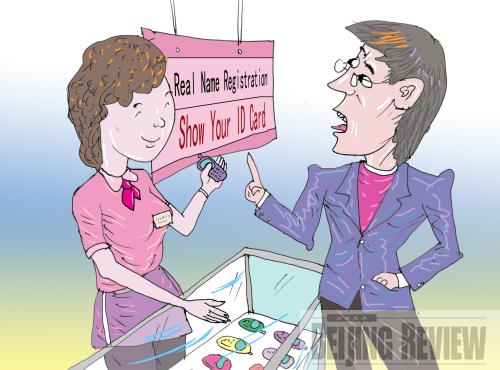|
 |
|
(LI SHIGONG) |
Although the issue was first thrust into the public eye three years ago, the cellphone real-name registration system is back in the news. The State Council of China is reportedly examining variations of how this system will work.
Three years ago, the Ministry of Informa-tion Industry and several other ministries jointly issued a regulation on real-name registration of cellphone users. By doing so, the government signaled that one of its intentions was to curb junk text messages. However, the real-name system never came to pass.
Statistics show that, of the more than 470 million SIM (Subscriber Identity Module) cards currently used in China, 300 million were sold without ID registration.
An online survey conducted by Web portal sohu.com finds that 70 percent of the respondents favor using ID to set up cellphone accounts, and more than 50 percent believe it will help curb spam messages and message fraud. But most of them are not optimistic about personal information security under the real-name system.
Another question being asked is whether the advantage brought by the real-name system is able to make up for the disadvantage brought by this system? While spam messages are reduced, users are meanwhile likely to leak their personal information, or it may be worse—while spam messages continue, the operators are making users' personal information available for money.
The bottom line it seems is that if cellphone users are required to provide their real ID for registration, the operators and the government must make sure their right to privacy will not be breached.
Used worldwide
Xiong Peiyun (Oriental Morning Post): Some have said that the real-name registration system for cellphones will only benefit the upper crust of society, while the man in the street will be taken advantage of. In all cases, the law means to protect honest people and to punish severely those who have committed crimes. The real-name system, from the perspective of security, not only gives people the sense of security but also makes the consequence more serious if wrongdoers break the law.
Another view is that the real-name system will obstruct the freedom of correspondence. Yet all over the world, including the United States, Britain and France, the real-name system operates well. The people in those countries do not lose their freedom of correspondence. Being anonymous makes control difficult, and is not a prerequisite of free expression. I think people using their real names can better serve the real freedom of expression.
Xiang Xiangrong (Qianjiang Evening News): The real-name system has been put forward before. At that time, more people spoke against it than for it. Some people argued that this system put all cellphone users under suspicion of misusing their gadgets, while others said that it would interfere with freedom of communication. There were even those who thought it was the same system used in banks, where real names are needed for transactions, saying criminals still could find ways to avoid being monitored.
The real-name system is a good way to decrease cellphone fraud. If there are any loopholes in the system they could be ironed out in future development.
Some people think that the real-name system for cellphone purchases will bring inconvenience to daily lives. But balancing individual interests and duty is the most reliable and effective way to be of use to society.
| 